




- BRNN
- BRI News
- BRNN News
- Database
Official Documents Polices and Regulations
Inter-government Documents International Cooperation BRI Countries
Business Guide Economic Data BRI Data
Trade
Investment Projects Latest projects
Cases - Content Pool
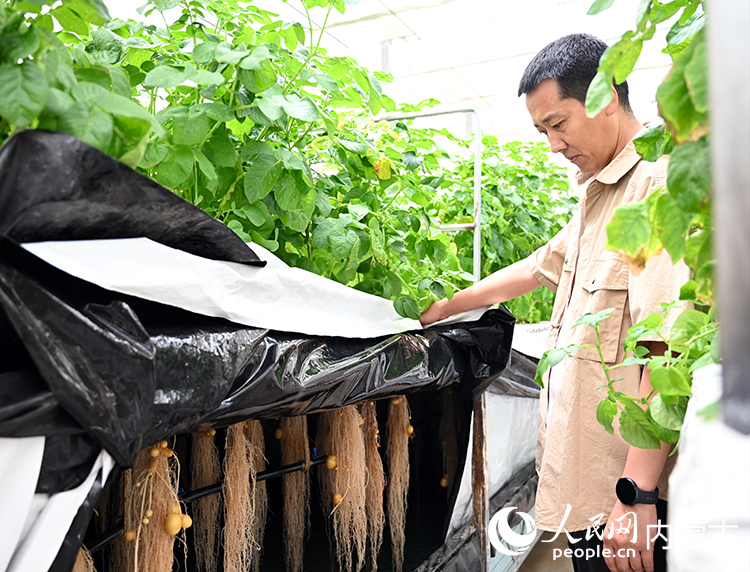
Pre-elite seed potatoes grown under an aeroponic system in a factory in Ulanqab, north China's Inner Mongolia Autonomous Region. (People's Daily Online/Liu Yilin)
During China's National Day holiday this year, tourists in north China's Inner Mongolia Autonomous Region rolled up their sleeves for a playful "potato hunt," searching among the ridges for small leftover potatoes after the main harvest, a pastime made possible by the region's vast potato fields and abundant yields.
The city of Ulanqab, known as "China's potato capital," has become a focal point of this unexpected craze.
With its booming potato industry, the city offers visitors a unique, hands-on glimpse of rural life. Many enjoy the harvest as a treasure-hunt-like experience that often becomes a delightful surprise during their trip.
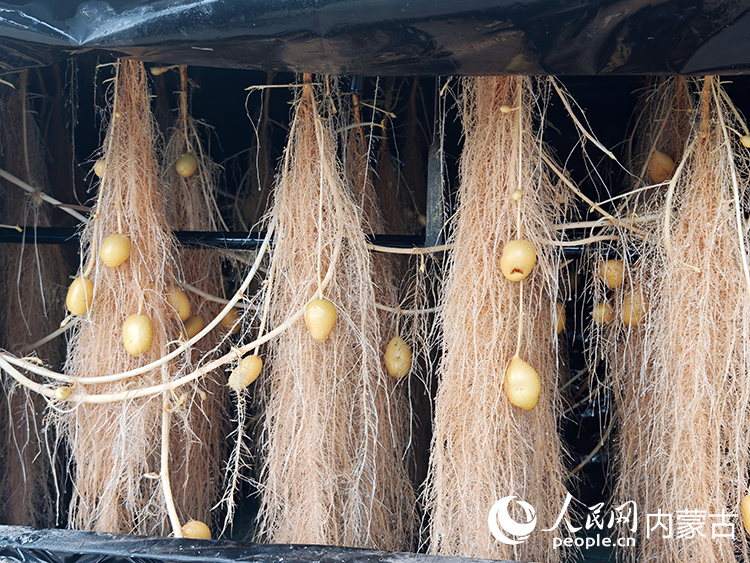
Pre-elite seed potatoes hang like clusters of grapes under an aeroponic system in a factory in Ulanqab, north China's Inner Mongolia Autonomous Region. (People's Daily Online/Zhao Mengyue)
As travelers showed off their special "souvenirs" and shared their lucky finds on social media, the high quality of Ulanqab's potatoes and the city's thriving potato industry drew widespread attention online.
Behind this quirky "potato-hunt" trend lies a rapidly growing, technologically advanced potato industry featuring improved variety breeding, large-scale mechanized planting, intelligent irrigation and modern farming practices.
In 2024, Ulanqab's potato industry achieved a total annual output of more than 2.17 million tonnes, the highest in Inner Mongolia.
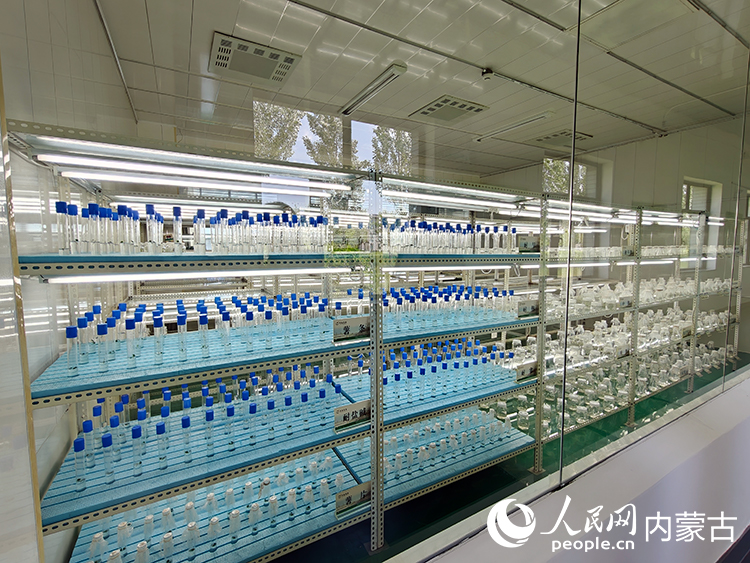
Photo shows the ambient-temperature potato germplasm bank of Zhongjianongye Biotechnology Co., Ltd., a company based in Ulanqab, north China's Inner Mongolia Autonomous Region. (People's Daily Online/Zhao Mengyue)
Meanwhile, the city's annual output value exceeded 7 billion yuan ($980 million), while its seed potato breeding bases covered a total area of 400,000 mu (26,667 hectares). Its production capacity for virus-free seedlings and mini-tubers remains the largest in the region.
Thanks to proactive efforts to attract cooperation and investment, Ulanqab is now home to 37 potato-processing enterprises.
These companies have a combined annual capacity of over 1 million tonnes of processed potato products across more than 20 categories and 130 varieties, injecting new vitality into the high-quality development of the local potato industry.
Kaida Hengye Agricultural Technology Co., Ltd. is a large modern food processing enterprise based in Chayouqian Banner of Ulanqab. It produces a wide range of potato-based products, from French fries and chips to potato cakes, vinegar, and even buns.
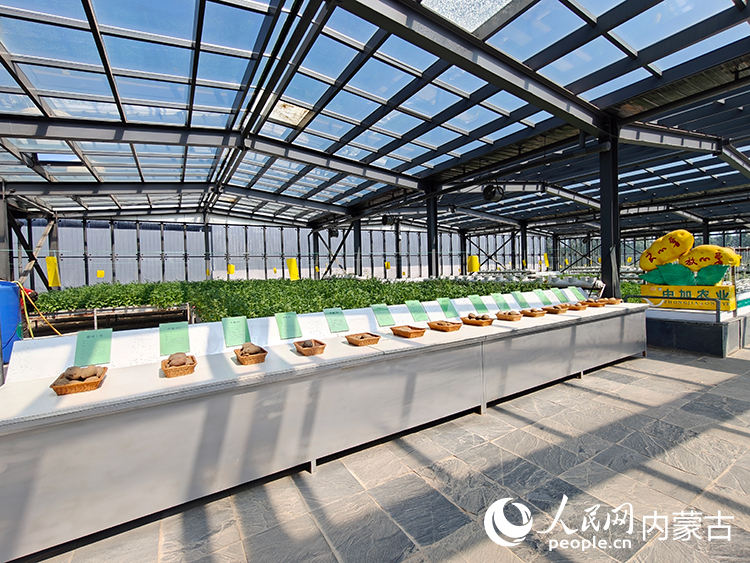
Potato varieties cultivated by Zhongjianongye Biotechnology Co., Ltd., a company based in Ulanqab, north China's Inner Mongolia Autonomous Region. (People's Daily Online/Zhao Mengyue)
The company, which integrates production, research and development, seed breeding, processing, and sales, has invested more than 3.2 billion yuan in expanding its operations. Its facilities include snack potato stick factories with a combined annual capacity of 70,000 tonnes, a potato museum, French fry plants with an annual production capacity of 600,000 tonnes, and related storage infrastructure.
"Within two to three years, our annual sales volume is expected to reach 400,000 tonnes, with market share rising to 40 percent," said Pan Jie, the company's general manager. "By then, we expect to help expand Ulanqab's total potato planting area to more than 4.5 million mu and raise the average profit per mu to 2,000 yuan."
The transformation of potatoes into profitable products would not have been possible without the high-quality seeds supplied by local enterprises.
Zhongjianongye Biotechnology Co., Ltd., for instance, provides growers with potato seeds offering unique advantages and operates intelligent seed storage facilities, each capable of holding up to 10,000 tonnes.
The company’s self-developed, high-starch potato varieties, such as Zhongjia 10 and Zhongjia 11, offer high-yield, high-return solutions for farmers struggling with deformities and low marketable yields in arid areas.
"While a starch content of 15 percent is generally considered high for ordinary potatoes, our new variety Zhongjia 10 achieves 18-20 percent, and Zhongjia 11 maintains a stable starch content of more than 20 percent," said Lyu Wenxia, the company’s technical director.
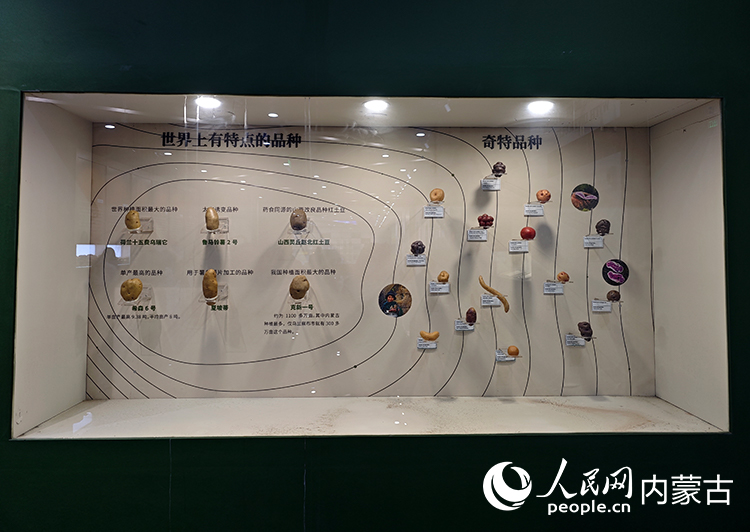
Various potato varieties on display at a potato museum in Ulanqab, known as "China's Potato Capital," in north China's Inner Mongolia Autonomous Region. (People's Daily Online/Miao Yang)
So far, Zhongjia varieties have been cultivated across more than 20 provincial-level regions in China, covering over 2.1 million mu of farmland.
At the foundation of the industry are pre-elite seed potato suppliers such as Inner Mongolia Xinyu Seed Industry Co., Ltd., which produces 45 million pre-elite seed potatoes each year.
The company operates 20 mu of aeroponic potato nurseries, where rows of pre-elite seed potatoes hang like grape clusters as a nutrient-rich mist is regularly sprayed onto their roots.
"Previously, breeding required using vermiculite as the cultivation medium, and each seedling produced only two pre-elite seed potatoes. Now, with aeroponic cultivation, each seedling can yield 80 to 100 pre-elite seed potatoes while effectively avoiding soil-borne diseases," said Liu Ruiping, chairman of the company.
Through ongoing efforts to improve cooperation mechanisms that benefit local farmers, the company has helped increase the incomes of more than 3,800 rural households by an average of over 900 yuan per mu across 60,000 mu of potato fields.
As the industrial chain expands into a multibillion-yuan industry, potatoes are evolving into a driving force for rural revitalization, creating new income opportunities for farmers and further promoting Ulanqab’s reputation as "China’s potato capital" across the country.

Tel:86-10-65363107, 86-10-65368220, 86-10-65363106